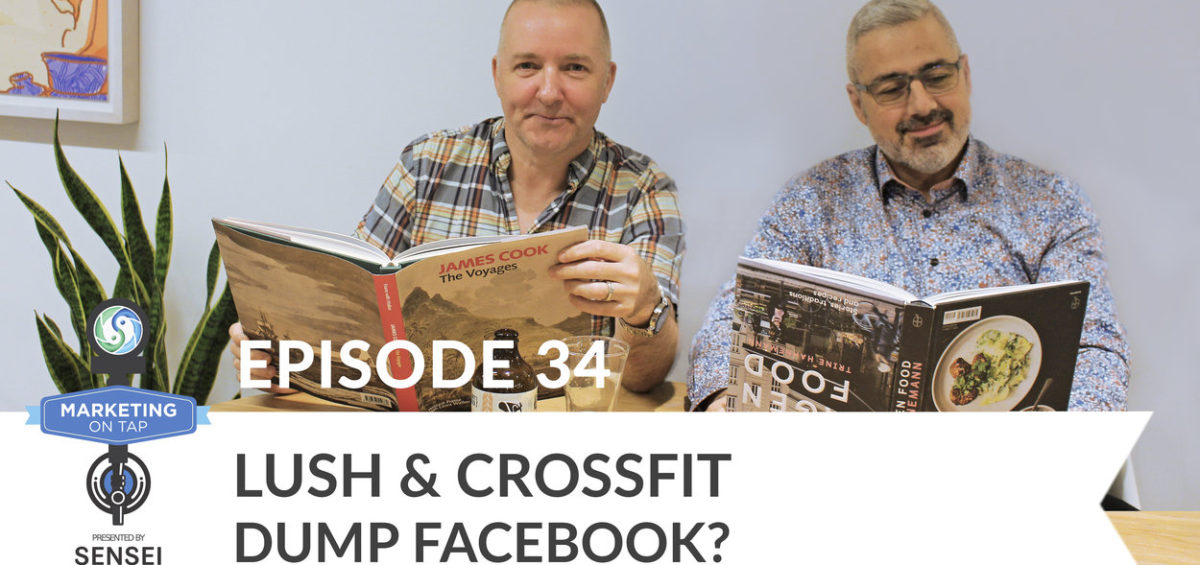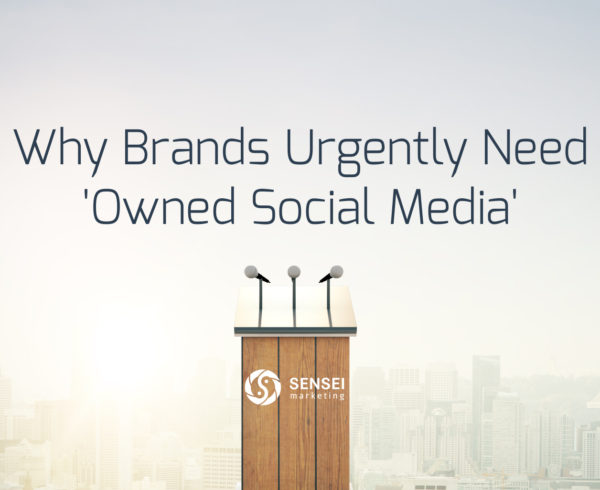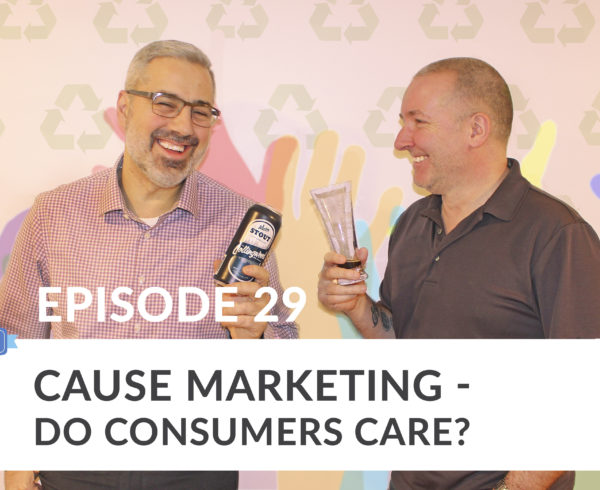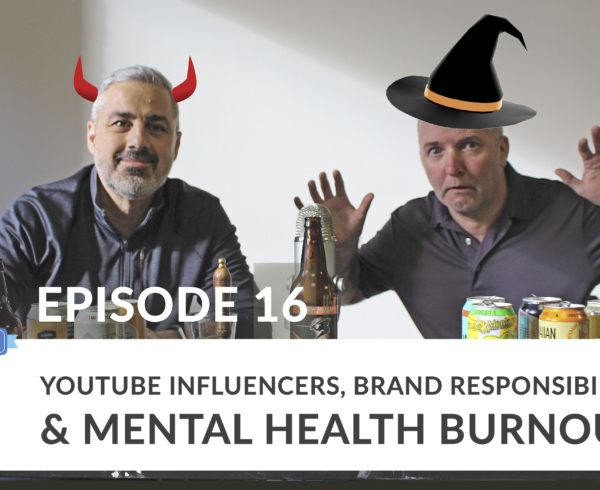With the news that CrossFit are deleting their accounts on Facebook and Instagram, the multi-national brand is just the latest in a growing number of brands pulling, or deleting, their social media accounts.
British restaurant chain Wetherspoons, cosmetics firm Lush, and now CrossFit – are these brands leaving social media just a one-off, or is this the start of a growing trend?
In this week’s Marketing on Tap podcast, we look at what this chain of events means for social media, and Facebook in particular, and what marketers need to be doing now to both monitor this trend, and stay ahead of it.
Settle back and enjoy this week’s topic, brought to you in the usual unscripted manner that you’ve come to expect when Sam and Danny take the mic.
If you prefer to listen on the go, the full audio version of this week’s episode can be listened to below
Prefer podcasts? Subscribe below:
– Apple Podcasts: https://goo.gl/F7Tcfq
– Google Podcasts: https://goo.gl/kV3zpY
– Spotify: https://goo.gl/3osGCG
– Stitcher: https://goo.gl/gEXL6v
– Pocket Casts: https://pca.st/BuRy
– Radio Public: https://goo.gl/KdjQ6L
– Anchor: https://goo.gl/Fu1jZQ
– Breaker: https://goo.gl/9cgqqw
– CastBox: https://goo.gl/uawi1D
– Overcast: https://goo.gl/nrKmLo
This week’s beer is Big Shot Black IPA from Annapolis Brewing Co.
***
Transcription:
Intro: Join marketers, authors, and craft beer enthusiasts Sam Fiorella and Danny Brown for a hoppy discussion on all things digital over a cheeky pint or two. Topics on the menu include influence marketing, social media, brand advocacy, and a taste distinct of real world digital marketing campaigns. Some are smooth. Others don’t sit so well. Don’t forget to stick around for last call where the boys will serve you up one final marketing takeaway that you can go out and apply in the real world. It’s a great primer before the weekend.
Sam Fiorella: Welcome back to another episode of Marketing on Tap. As always, my name is Sam Fiorella. This is Danny Brown.
Danny Brown: Morning.
Sam Fiorella: Danny, today, I want to talk about Facebook.
Danny Brown: Yay.
Sam Fiorella: Yeah, Facebook. Everybody’s favorite topic. It’s actually not about Facebook, but Facebook has had a bit of a rocky time. We know that and we don’t want to necessarily re-litigate analytica or politics, but there’s a lot of brands that are now standing up and saying no more to Facebook. Earlier this year, Lush, the cosmetics giant decided to pull all of its advertising dollars from social communities such as Facebook and Instagram, choosing to invest in its own media.
Sam Fiorella: Also in the UK, Wetherspoons, one of my favorite places of pubs to hate, decided to shut down all of its social media communications, citing online trolling as one of the reasons that they just said, “Nope. You can engage us on our app. You can engage us on our website. We’re going to talk to you through our magazine as always, but we’re pulling everything in.”
Sam Fiorella: More famously right now, crossfit this week stormed off Facebook and Instagram stating that the social network, and I have to read this, is complicit in the global chronic disease crisis. More specifically, it claimed that Facebook’s news feeds are censored and crafted to reflect the political leanings of Facebook’s utopian socialists. I’d like to know how many PR specialists they had to put together to put that statement out. Anyway, crossfit is the one that actually really got me thinking simply because, well, we have a … they’ve got a huge following and this could actually mean something for Facebook.
Sam Fiorella: So basically, there’s a trend happening here that I think we need to discuss. So that’s today’s topic. Do brands fight conventional wisdom that these platforms are a vital component of a marketing mix? Or can they successfully get off them and still be successful in the marketing world? That’s what we’re going to be talking about.
Sam Fiorella: In the meantime, we are pouring a guest beer today.
Danny Brown: Yeah. So one of your friends brought this back from … where is it?
Sam Fiorella: Chris, Chris Hopkins brought it back from Nova Scotia. So this is a Nova Scotia beer.
Danny Brown: That’s a far, far, far away beer. Okay, so this is Annapolis Brewing Company.
Sam Fiorella: Annapolis.
Danny Brown: Annapolis.
Sam Fiorella: You Scot.
Danny Brown: [inaudible 00:03:04]
Sam Fiorella: Annapolis.
Danny Brown: Polis is Scottish for police. So Anna is a member of the police. Annapolis. There you go.
Sam Fiorella: With your Scottish accent, you actually got closer to the name than with …
Danny Brown: Really?
Sam Fiorella: Yes.
Danny Brown: So this is big shot black IPA. It’s got a blend of base and dark malts with Cascade, Simcoe, and Citra hops. That’s a really good mix of the hops for an IPA. A big beer at 7.1%. So that’s a big beer for the day.
Sam Fiorella: Morning beer at 7%. I love it. Okay, let me get the Anna cam going to see what Anna thinks of the beer while we do this. All right, everybody. Cheers.
Danny Brown: Cheers, mate. Cheers.
Sam Fiorella: Wait. Anna don’t. I want to get you on camera.
Anna: Yeah.
Sam Fiorella: Mm-hmm (affirmative)
Anna: It smells hoppy.
Sam Fiorella: You know, he brought it because he knows I like dark beer, but I think he forgot that I hate IPA’s. I have to admit, the bitterness actually only comes out at the end. So when you’re first tasting … oh, that’s a … oh, there the bitter is.
Danny Brown: [inaudible 00:04:12] comes in.
Sam Fiorella: Yeah. I’m not that big of a fan. It’s not going to stop me from drinking it, but I’m not that big of a fan. All right, so let’s get back to the topic. I want to start with Lush. I want to go through these three case studies and just talk about why they made this decision and what’s the potential impact on their business and what should other marketers be learning from this because I think that these are the early days of what I think is going to become more and more of a boycott against social platforms. Each one of these did it for a different reason that I think is worthy of exploring.
Sam Fiorella: So we start with Lush. So Lush decided, and I think they did it in a really good way. They decided that they’re going to stop being on social media by posting on social media, but with a really good message. They said … well, a good graphic that I’m sure Anna will put in here in the video, “We’re switching up social.” So instead of we’re switching off, we’re stitching it up.
Sam Fiorella: What they’re basically saying is that owned media doesn’t have to be on social platforms. Owned media could be on their own platform. So they’re taking everything back and they’re developing communities but on their own site. It’s a huge, huge risk. The big problem for them, and this is what I want to talk about, Danny, is that their analytics, their social analytics showed that Facebook only serves up their content to 6% of their entire audience that they’ve spent all of this time and money to accumulate.
Sam Fiorella: So this has been my biggest problem with Facebook communities, which is why we started Bondi and one of the reasons why in our platform that we build for clients we do this, is that you spend all of this money with Facebook and your time to build up an audience to get fans, and then you got to pay them to advertise to those people that you paid to build and get on as a fan. So it’s just a racket.
Sam Fiorella: These guys said, “Hold on, this is just silly. We’re not going to do it anymore.” So they decided to only pull for the time being their UK brand off. The US brand, the North America brand is still online. I think this is a really interesting case study for us to follow. So is Facebook or any of these social media platforms, is that community mandatory for brands? Or can a company like this actually do better by pulling off of those social networks and building their own offsite communities.
Danny Brown: Yeah, well, first I’m interested they even got 6%.
Sam Fiorella: Yeah.
Danny Brown: You know, reach with a organic [crosstalk 00:06:48]. Well, even less. I mean, some brands they only see about 2-2.5% reach. So the organic reach is pretty crap on Facebook. With their latest changes where they’re putting it back to stories and private communities et cetera, it’s even worse now. It’s going to get worse for these brands.
Danny Brown: So you mentioned before, we do that with our own clients. We’ve got clients that we’ve pulled onto their own communities, and engagement there is just through the roof. It’s excellent. We have a mobile app and engagement there is excellent for one of our clients. So it shows that when you do actually own the community and own the content and the audience to a degree, you’re not going to lose engagement. Obviously Facebook has got wider reach globally, but who cares? If you’re in the UK, you want UK customers. I mean, you’re in North America, you want North American customers. If you’re in South Africa, you want South African customers.
Danny Brown: So it’s coming back to niche. I applaud the way, as you mentioned, Lush did it. I don’t think it will harm them as much as Facebook might like us to think it does.
Sam Fiorella: Well, and I think … so internally we had this conversation when we first heard about brands getting off of social media. I remember Robert said to me, “I don’t agree with that.” As a marketer, one of the number one rules of marketing is you need to be where your clients are. So if your clients are on Facebook, you need to be on Facebook. So what they’re basically saying …
Danny Brown: Like customers?
Sam Fiorella: Customers. Sorry, what did i say?
Danny Brown: Clients.
Sam Fiorella: Customers, clients.
Danny Brown: Customers.
Sam Fiorella: Yeah, well …
Danny Brown: That 7.1 is hitting you.
Sam Fiorella: Yeah. Morning beer. So yeah. So if your customers are there, then you need to be there whoever your audience is. So this is where I think they are really leaders in this space, and I do believe personally that you need to own a community. The problem with these platforms is that you’re building a community on their platform. It’s a community that you don’t actually own. They own, they’re monetizing it so they’re making money from all of the free work or paid work, whichever, that you’re doing on that community.
Sam Fiorella: Then what happens, you know in the crossfit example, they just decided to delete one of the communities that was supporting crossfit. They had that. They had this right to basically close down a community, and apparently as we’re going to talk about later, without any type of notification or without any explanation. Let’s face it, Facebook is not a trustworthy company.
Danny Brown: No. [crosstalk 00:09:16]
Sam Fiorella: I think that’s been proven over and over again, and no matter how much you try and change that perception, it’s not going to happen. So as a brand, I don’t know, for me a community is my asset. You know what I mean? I want to own that asset. I want to leverage that asset. Why would I build a community where someone else has complete control over it where I don’t even have access to the full database? You know what I mean? I have to pay them to have access to my database. It’s just an insane model.
Sam Fiorella: Before social media, if I pitch this to a client to say, you know what I mean, “We’re going to build a community for you, but you don’t own it and you’re going to have to pay to access it after you’ve paid me to build it.” I mean, they would tell me to go for a long walk off a short pier.
Danny Brown: Jump off a high bridge or whatever. Yeah.
Sam Fiorella: I mean, so it just makes no sense.
Danny Brown: Short pier, high bridge.
Sam Fiorella: Is that what it is?
Danny Brown: No, no. You did the short pier. I did high bridge.
Sam Fiorella: High bridge?
Danny Brown: Yeah, jump off a high bridge.
Sam Fiorella: That must be a Scottish thing.
Danny Brown: Yeah, you go fishing and you fall off.
Sam Fiorella: You fall off a pier when you fish?
Danny Brown: No, you fall off a high bride when you fish. It’s a Scottish thing. I’ll explain later.
Sam Fiorella: Oh, my God. Okay.
Danny Brown: We could go down a whole new rabbit hole here.
Sam Fiorella: You could imagine when we were in Scotland and the two of us together for two weeks drinking, how many times I looked at him like, “What the – are you saying?”
Sam Fiorella: All right, so Wetherspoons. Speaking of the UK, my first time in a Wetherspoons … is that how you say it? Wetherspoons?
Danny Brown: Wetherspoons. Yeah.
Sam Fiorella: Yeah. Not a fan. But anyway, that’s beside the point. So they went off, but they went off social media unlike crossfit. Sorry, unlike Lush, which said that they decided to jump off simply because they didn’t like the policy of having to pay twice or be held ransom to access their community. They went off because of the negativity.
Danny Brown: Right.
Sam Fiorella: This is what I found really interesting. The CEO of the company … no, not the CEO. Yeah, the CEO President.
Danny Brown: CEO President.
Sam Fiorella: He said that because of all of the negative trolling that was happening with MP and parliament that he was reading because of this whole Brexit thing that was going on over there, he just saw so much negativity. He says, “Do I really want to build a community in this hostile environment?” The thinking was that he would have to become just as hostile with his brand if he was going to communicate. So he said, “Screw it. We’re out.” They closed their account and they had some decent numbers there in terms of a following. This is at a time that they’re moving into America. So they’re looking to expand beyond the UK and come into America without a social profile. He says, “We’re going to continue to put out our magazine. We’re going to continue to engage people on our app and on our website. We encourage you to talk to us there.”
Sam Fiorella: So how much of this is marketing? How much of this is just, you know what, they never got social media right in the first place? They just don’t want to bother.
Danny Brown: Well, and the guy, the CEO, he’s a pro Brexit campaigner. He’s put a lot of funds and belief in the campaign. So it made sense for him to leave for that reason. That’s more a political move I think [crosstalk 00:12:13]. His personal politics coming in to play there.
Danny Brown: Yeah, I mean, in the bigger picture, I respect the decision that he’s moved away because of the negativity, and I think more brands need to take a stand because it wasn’t negativity towards his brand, which I find interesting. It was overall negativity by trolls towards other people, whether that’s politicians or campaigners or supporters of another belief or et cetera. So I give kudos for that. I wish more brands would take that stand to push back on these networks and say, “Okay, you’re going to lose our money if you don’t start sorting out.”
Danny Brown: That being said, to launch a brand in North America that’s already got such a huge myriad of breweries and restaurant chains, et cetera, I think it’s hard to do that unless you’ve got a ton of money to put into paid advertising because nobody knows you from Adam. They know the Applebee’s, et cetera, but they don’t know Wetherspoon.
Sam Fiorella: Well, do they know Wetherspoons? I mean, even in the UK where they have been engaged, they don’t really engage much, right? From what I understand, there’s about 44,000 followers on their Facebook account. Then have over 100,000 on Twitter. You know, but really all they ever posted was just items from their menu. They really didn’t engage much. They didn’t post very much. So what’s a brand like them to do, especially on a bar?
Sam Fiorella: I mean, I look at me with the airlines that I fly and the commuter train in the morning. A day doesn’t go by that I’m not posting something complaining about whatever lineup or the air conditioning is too high, too low, but people get back to me. So if nothing else, just for customer service, it’s important to be there. These guys are going completely off. If you’re not on social media, this is the catch 22 for a brand. If you’re not on social media to listen, just because you’re getting off doesn’t mean your customers are getting off, right? So if they’re going to be there and they’re going to say something negative about you or positive for that matter, you’re not going to be there to hear it or to respond. That’s a big risk that these guys are taking.
Danny Brown: It is. It is a big risk, but I think you mentioned they’ve got a mobile app as well for feedback. So if you swing it back to that and you encourage … because people like you said, we’re always on our phones, we’re always doing something. If you have an app and you can get direct feedback and get personal one to one immediate feedback there either through AI bots to start a conversation and then continue with a CSM …
Sam Fiorella: Move it back.
Danny Brown: Yeah, exactly. I think that’s more valuable as opposed to being on social where you could get lost in a whole bunch of voices complaining about the same thing as opposed to someone that’s actually monitoring these at conversations coming. So if they use it properly from an app point of view, I think they’ll be okay.
Sam Fiorella: That’s an interesting point because we’ve really trained or I was about to say, brands and marketers have trained consumers, but it might be that consumers have trained us to have to be there to deal with this online complaints, right? Because most people will complain online as opposed to giving you kudos for something.
Sam Fiorella: So if we train our customers, “If you want to say something to us, download our app and you have direct access to us.” So I think if we’re going to give any type of advice here for marketers listening in or brands, whether you’re a marketer or not listening in, number one, I personally don’t believe that you have to be on Facebook. I know amongst the marketing community that is a huge thing. [Sensei 00:15:45] our own company is not on Facebook. I don’t see value there because our clients aren’t there.
Sam Fiorella: Then if I’m there and I have a profile, I have to engage. So I would rather say to a brand, listen, spend the money to build an app or website or some type of online community, where you provide value added, engagement, value added offers, value added content, whatever if it’s education, entertainment. Work that and encourage your consumers to go there. You can still monitor, use social media monitoring tools to see is anybody out there talking about us? So that if you want to get your advocates to get out there or maybe you just have a general PR account like instead of creating ABC company Twitter, you can say ABC PR Company or ABC company PR. This is just our PR account.
Sam Fiorella: So what you do is you just direct everybody to engage directly, but what you’re going to have to do is provide more value than what someone is getting on social media because on social media, they have the added benefit of communicating with their friends, listening to the news, getting other types of entertainment and information. If you’re going to encourage people to download an app, you can’t have an app that mimics what you’re doing on Twitter. I mean, you actually have to look at how do you enhance that customer experience with your brand because that’s an investment of their time to download the app, to check the app, to receive notifications, the push notifications that are going to come to you. So you better be sure that you’re not just replicating what’s already out there, but you’re adding additional value. That’s one of the tips that I want to laeve out there.
Sam Fiorella: All right. So our time is running out, so let’s talk about crossfit because that’s the big one right now. Unlike these for two, crossfit is like Mac. It’s a cult. Here they have hundreds of thousands of followers around the world. Crossfit isn’t a product like Lush is or like Wetherspoons bar is. They are a culture, you know what I mean? They’re a belief. It’s one of the most annoying people on social media are cross fitters because all they want to do is talk about crossfit.
Danny Brown: Everybody knows you’re doing crossfit.
Sam Fiorella: Everybody knows you’re doing crossfit. I guess, to a degree … I’ve been working out a lot lately and to a degree I’ve been posting a lot more stuff on social media about my exercise routine. So I kind of understand that. They’re just such rabid fans.
Sam Fiorella: So let’s go back to why they went off. They went off … first of all, crossfit is a huge multi national corporation that has people not only participating in crossfit routine, but they’re opening up their own gyms to deliver cross fit. People are buying crossfit T-shirts and products. Anyway, they decided to go off because a Facebook community was shut down by Facebook.
Sam Fiorella: Now this wasn’t their community. It was an independent third party community that was made up of cross fitters talking about low carb diets and everything crossfit basically. Everything that supports crossfit. Facebook shut it down with no reason and then for whatever reason put it back up again. Crossfit lost it. It’s a single owner. This is not a group of people. It’s not a publicly traded company. He has a history of going up against big brands. He’s been in a fight with coco cola for a long time. So he said, “Hold on.” This is where he came up with those outlandish statements about them being the devil incarnate.
Sam Fiorella: He basically said, “Why would I support a community that’s actually negative, not only to our physical and mental health,” and we’re all about health. “Participating on social media is actually negative. So why am I supporting this with our communities, number one. Number two, you have this arbitrary right to cancel communities because it doesn’t fit your world view or because of the content within it might not support your world view. So I’m not going to support this and I’m pulling off and guess what? I’m going to encourage all of my followers to get off.”
Sam Fiorella: I think this is the …
Danny Brown: That’s the big one, I think.
Sam Fiorella: Just the fact, this is a first time that a multi national corporation with the type of following, rabid fan base that these guys have, is now pulling off and telling their followers, “Come join us elsewhere. Get off of these social networks.” This is where I think he might actually be starting something.
Danny Brown: Yeah.
Sam Fiorella: What’s the risk? Does Facebook care? Does Facebook care that their hundreds of thousands of followers might not be engaging online anymore with them?
Danny Brown: Well, considering Facebook’s got two and a half billion users, whatever it is, across the globe at the minute … I don’t know. I think we’re starting … you mentioned earlier, I think we’re starting to see a trend. This is the last two years that all these examples have come out, right?
Sam Fiorella: Yeah.
Danny Brown: Crossfit, for the reasons crossfit gave, that’s a big wake up call, I think. Especially at the moment because the hypocrisy for me of Facebook is they took down a community of fans that had built around a crossfit brand and that’s why the guy pulled it, but they won’t take down a doctored video of Nancy Pelosi of the US that’s made to look …
Sam Fiorella: That’s been proven to be doctored.
Danny Brown: Exactly. So it’s like it goes to this whole fake news of they’re happy to let fake news stay on the network even though they’ve said they’re going to work against these fake news things, but they take away genuine communities.
Sam Fiorella: So let’s look at the other side. There argument for keeping that video live is that this is what somebody has put out there. We’re going to leave it. This is free speech. We’re going to leave it to the community to decide if this is valuable to them or not and they can watch it or they can not watch it. They can like it or they can not like it. So that’s the statement that they’re putting out and the reason why they’ve said that they’re not going to take it down.
Sam Fiorella: But then again, when you look at it on the other side, they had this community that they shut down for no reason. They haven’t given a reason why they took down this community with all of these thousands and thousands of followers, avid followers, people engaging everyday. So this is why I’m thinking that this might actually be the start of something that brands really need to pay attention to.
Sam Fiorella: There is no consistent line coming out of Facebook. This is what it is. There’s no self regulation. They say there is but clearly there’s not. There is no concern for privacy even though they say that they’re trying. It just keeps getting proven. Every time Zuckerberg gets up there and says, “This is what we’re going to do,” he puts out his manifesto, they want to go dark social. They want to keep doing this stuff. Within days of that, there’s some other scandal that comes out, right? If it’s not with Facebook, it’s with Instagram or one of the other properties that they own.
Sam Fiorella: So there’s just all of these issues, and now a brand like this is saying, “Hold on.” What’s really powerful with these guys is not only because of the size of their followers, but because they’re actually saying, “Listen, we are a health company. We’re all about being healthy.” Being on Facebook, they’re now reiterating a lot of what science is showing is that the more time you spend on Facebook, the worse your mental health is, forget your physical health.
Sam Fiorella: So they actually might be starting something that I think brands need to start paying attention to. If Lush didn’t do it for you or Wetherspoons didn’t do it for you, if the fact that Sensei Marketing, our little company here is off of Facebook, if that didn’t do it for you, as a marketer you need to be paying attention to this because I think this is a sign of much bigger things to come.
Danny Brown: I agree.
Sam Fiorella: Okay. So we’re getting the signal.
Danny Brown: Thanks for the bell, Steven.
Sam Fiorella: Thank you, Steven, for our bell. This is the last call. What is our final parting thought for those listening so diligently?
Danny Brown: Yeah, the whole [crosstalk 00:23:39]
Sam Fiorella: Try speaking English this time.
Danny Brown: Okay. I’m not going to do my English voice again. That was just a fail, major fail. No, I think it’s going to be interesting. Like you said, marketers do have to watch the next six to twelve months and see what other brands may be doing or thinking of doing or talking about doing, and start planning for … we know that Facebook is going into private communities. They’re all about encrypted messaging, and we spoke about that in a previous podcast.
Sam Fiorella: Dark social.
Danny Brown: The dark social podcast about planning for the encrypted communities. This is another wake up call that maybe Facebook is not where you need to be plowing your money into. Plow it into an app, build a community, build up volume, and start owning, really owning your community again.
Sam Fiorella: Right. Yeah. I agree. I think this is a sign of things to come, and I highly recommend those of you that haven’t listened to our dark social podcast to go back a few weeks.
Danny Brown: We’ll link it up here if you’re watching on YouTube.
Sam Fiorella: And check that out because if you are going to be on social media today, dark social is where it’s going. Then again, that’s a closed community, which you have even less access to if people are creating these communities. So everything that’s happening here, this whole trajectory of where social is going, between the statistics that are showing the negative mental health effects and everybody taking digital vacations and taking time away and the end consumer taking time off of social media and now brands saying, “This is not good for our business, it’s not good for you. We need to get out.”
Sam Fiorella: You really do need to be paying attention to where else can I build these communities? Because if nothing else, social media proved that online communities is a fantastic tool to develop influencers and to find influencers, develop advocates, and develop a loyalty to your brand that you may not have been able to have before. So what is it that you’re going to do? Where are you going to build that community? What tool are you going to use to build that community? I mean, if you’re a large company, that’s a little plug for our company. You might want to check out bondi.co, but if it’s not that, what is it?
Sam Fiorella: If it’s an app and you’re going to do everything on site of an app, just make sure … I want to reiterate an earlier comment as my final message. It has to be more than what you’re doing on social media, provide value added entertainment, value added information. That’s evergreen content that allows people to come together for a reason other than transacting with your business. So that’s my final thought.
Sam Fiorella: If you’ve got any other questions, comments, please feel free to message us. Leave it in the comments wherever you happen to be. If you’re watching this video, leave it on YouTube, otherwise, reach out to us on one of our social accounts, or if you’re not on social media, get us the old fashioned way. Look us up and give us a call.
Sam Fiorella: That’s it for this week. Thank you very much everybody.
Danny Brown: Okay, and if you’re watching on YouTube, make sure to hit the little like button and subscribe for future updates. There’s going to be [inaudible 00:26:30]. Subscribe’s down there. I know that, and like’s up there. So that’s all good. If you’re on podcast, check out the show notes. We’ll make sure to drop all the show notes and the links that we’ve been talking about today. Recommend to your friends and leave us a review on iTunes. That’s always welcome.
Sam Fiorella: Thank you everybody. Thank you, Anna.
Danny Brown: Thank you everyone.
Sam Fiorella: Cheers.
Danny Brown: Cheers. Until next time.
Outro: You’ve been listening to Marketing on Tap with Sam Fiorella and Danny Brown. If you enjoyed this episode, make sure to subscribe so you don’t miss the next one, and please feel free to leave a show review. That’s always worth a cheers.





